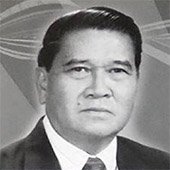
Ernesto Tabujara
“There’s no substitute for hardwork. So that before when the professor would tell us to answer items 1-5 for our homework, I would answer items 1-20, or as much as I could. Of course I did not get the correct answers all the time, but at least, naisip ko na before anyone else. You should not seek to satisfy the university or other people, for that matter. You should seek to satisfy yourself.” This Ernesto G. Tabuhara says as he settles into his twilight years, a man of many accomplishments. “I worked so hard all my life. If you read my bio-data, I think you will find it very impressive. There is nothing that I have done that I am ashamed of. I think I encompassed many fields that many other people may not have covered. I was very active in professional organizations and I was very active in UP. Parang sabi ko ngayon, ;Did I do all these?”
Among Tabujara’s accomplishments were teaching and holding various administrative positions in UP. He was a member of the Board of Regents (ex officio member, 1984-1987; regular member, 1995-1999); Chancellor, University of the Philippines, Diliman (1984-1989); Vice Chancellor for Community Affairs, UP Diliman (1984-1989); OIC University of the Philippines System (March-Aug 1987). He did his UP work at the same time as his work in the private sector, which included: being past board chairman, president, and chief structural engineer of DCCD Engineering Corporation; current board chairman and director of Geotechnics Philippines, INc.’ and consultancy work for Geodest Services, Inc. He was also elected to various honor societies.
Tabujara says that he had always wanted to be an engineer. He would build miniature bridges, houses, and roads on the sand when he was a child. Now he is pleased to see one of his grandchildren doing the same. He says it seems to run in the blood, especially since he believes his engineer-son is now a better engineer than him. It is a proud father who points this out.
It was not just his children that he taught to be excellent, but generations of future engineers at the College of Engineering. He took on a heavy workload at the start of his teaching career – seven classes in a single semester. He says that teaching in UP will not make anyone rich, but learns prestige and psychological rewards.
Along with his teaching are his contributions to the practice of the engineering profession. Tabujara says, “I think I admire myself for having been able to take two general tasks and to apply them in my profession: the teaching aspect and the practice aspect. Putting those two together creates great advantages. Because if you are active in practice and you also teach, you are a better teacher because you know what is happening out there in the field. If you are a teacher and you are also practicing your profession, it makes you a smarter practitioner because you always know the theories and the rationale behind the practical aspect.”

